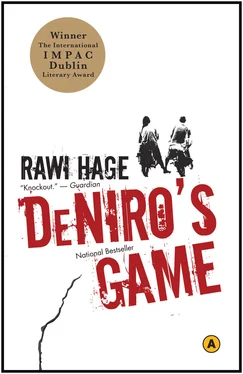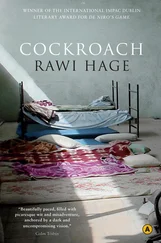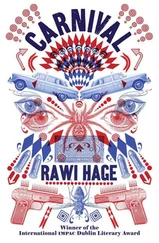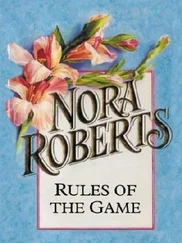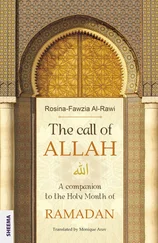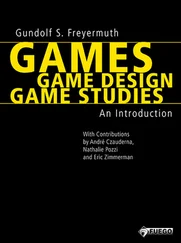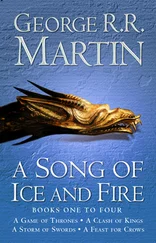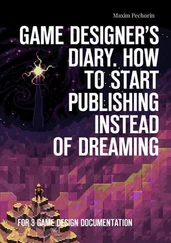THE HEAT MADE MY THROAT DRY; I WAS LYING IN MY underwear thinking of Rana.
I put on my jeans and I went down the street toward her house. As my foot touched the melting earth, church bells rang. Miracle! Miracle! shouted Wafa and rushed toward the sounds. Issam scratched his head; Boutros looked at the sky. I walked toward the church and saw a crowd gathered around its door, old ladies in black beating their saggy chests. I grabbed Salah, the plumber, by the hand, and in a low voice I asked what was happening. He answered, There is a young girl who saw the Virgin Mary hovering in the sky. She opened her robe and shielded us all from the Muslims’ falling bombs. The girl’s hands are secreting holy oil.
The church was packed. Mumbles fused with prayers, prayers combusted with the holy waters and burned in candles. Collective chants slid toward the skies.
Like a reptile with moist skin, I slipped into the mob. I made my way toward the front of the church, separating the crippled from their mothers, the blind from their canes, the faces in tears from their sweeping palms. Above the kneeling heads I moved forward, toward the golden icons, then stood to the side and watched: she was there, standing like a statue, a young girl I had never seen before. She was looking up to the ceiling; her hands were open and shiny. She was young, in her teens, and her eyes shone with madness and evasion. A small smirk was on her lips, and she looked hazy and eerie.
The priest puffed incense around the girl. People crossed themselves, and an old lady rushed forward and touched the girl’s hand. The priest pulled the old lady back and drove her away, but then the crowd moved forward and reached for the girl. A few men moved in and pushed the crowd back, forming a shield to protect the young woman. The girl was taken back behind the altar. The low hums and hysterical cries, the reaching hands and beating of chests, the fog of incense, the superstitious shrieks, the sight of pious bodies on crushed knees, the unbearable heat, all these made me seek the open doors. On my way out I grabbed the woman who had touched the girl’s hands, held her fingers to my nose to smell, but the old woman liberated her hand, pushed me back, and shouted at me: Faith! Faith! I made my way out of the crowd like the spear of a warrior in retreat.
For days, people flocked to the church from all over the city. The tolling of the bell muffled the bangs of bombs. My mother’s radio and the ring of bells deafened me.
IN THE EVENING, the sun departed. A bright, round moon arrived and occupied its place. It hovered above the Virgin Mary, made her blue dress glow white, and formed a halo above her head. Down below, a crowd rushed toward the church, bounced, splashed, and retreated from its walls like the tide.
Rana and I were naked in George’s room at his apartment. Rana’s hands were dry and warm, her thighs wet as silk sheets dipped in holy oil. She covered herself and listened as I dreamed about the pigeons in Roma.
You want to go to Roma?
I am thinking about it.
And what, you’ll leave me here?
No, you can come with me.
And what would I do in Roma?
Study, walk the streets, and come back to me.
And how would we do this?
I am working on it, I said.
Rana got up and went to the kitchen. There were dirty dishes in the sink. She squeezed soap onto a sponge, poured water into the sink from a bucket, and rinsed the dishes.
I cannot stand dirty dishes, she said. It drives me crazy. Go outside and see if there are any nosy neighbours on the stairs; I have to go home.
I opened the door and looked outside. There is no one, I told her.
Rana covered herself and ran down the stairs.
Close the door, she whispered fiercely on her way down. Go inside! Close the door, someone will see me.
I kept the door open, smiling and looking at her.
LATER THAT EVENING George joined me at his place.
From the balcony I saw him drive up in a jeep. He was wearing a militia uniform and holding an M-16. When he got out of the jeep he switched his rifle from one hand to the other. He knocked at his own door. Is Rana still there? he asked me.
She left. New clothes? I asked.
He did not answer. He laid his rifle on the sofa, took off his boots, and said, Abou-Nahra called me in.
And?
He asked me what was happening down at the casino. I think he smells something.
I doubt it.
Well, he asked me to join. He looked me straight in the eyes and said it’s better for everyone. You know what he meant, don’t you?
So you got alarmed and joined? Maybe he meant that you might lose your job.
No, I know what he meant. I was there.
Where does Abou-Nahra live? I asked George.
He is always surrounded by bodyguards, Bassam. Forget about it. Listen, we better cool it with the poker machines for now. He held his rifle closer to his chest, against his khaki shirt, under his chin. Then he pointed it at me and smiled.
Hold it. See? It’s light as a feather. He took off his clothes, went to the bathroom. Fucking water, I heard him cursing.
He pulled on his shirt and pants, went up to the roof, and came back with a bucket. While I poured water on his head, he washed under his armpits. When he was finished washing, he dabbed cologne under his chin.
I am going to meet the Broumana woman, he told me.
She called?
He nodded and combed his straight black hair. Are you coming?
No, I am staying. But leave me the handgun.
He tossed it on the sofa and asked no questions.
I TUCKED THE GUN under my belt and walked over to Joseph Chaiben’s house. I climbed up the open stairs, smearing the dirty marble with my footprints. Joseph lived in one of those old Lebanese houses, a mixture of Florentine and Arabic architecture, that are overwhelmed by larger, modern buildings with mechanical elevators and large balconies.
I knocked at Joseph’s door. His mother opened. I greeted her and asked after her health. She invited me in and called to her son. Joseph had been asleep. He entered in his shorts, a sleeveless white cotton shirt, and plastic slippers that complemented his mother’s cheap tablecloth. As he greeted me, his mother brought me a drink, apologizing for not having ice, complaining about the water shortage, the war. . life. . Her words echoed my mother’s.
When Joseph and I went up to the roof, Joseph’s mother shouted from below, The roofs are dangerous; there are snipers everywhere! Come down here; talk in the room. I will leave; come back down.
But the roof had no walls and we wanted no echoes, so we ignored her. I showed Joseph the gun and asked him if he knew of someone selling a gun like it. He held it, took off the magazine, put it back on, cranked the gun, aimed it toward West Beirut and fired.
Beretta, I said. Nine millimetre, ten shots. Clean, never used in combat.
I will look into it.
How are Khalil’s parents doing? I said.
His sister saw me on the street the other day. I was coming back from the front line in my uniform, gear and all, and when she saw me she started to shout, You people killed my brother. You are all thugs and criminals to take young men to war. He was seventeen, she said. A baby, seventeen!
Joseph shook his head and inspected the gun again.
Do you still go down to the front line? I asked.
Yeah, he said. Abou-Nahra won’t let me leave. You know, once you’re in, you’re in.
And what does Abou-Nahra think about Khalil’s death?
He asked a lot of questions but never said anything to me.
I promised Joseph some oily, shiny hash; he smiled and said he would do his best to find a good gun for me.
When we went down, his mother was gone; Joseph went back inside the house.
Читать дальше
